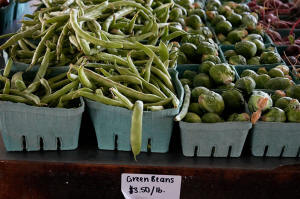Trump administration faces a deadline to tell judges whether it will use
contingency funds for SNAP
[November 03, 2025]
President Donald Trump's administration faces deadlines on
Monday to tell two federal judges whether it will comply with court
orders that it continue to fund SNAP, the nationís biggest food aid
program, using contingency funds during the government shutdown.
The U.S. Department of Agriculture planned to freeze payments to the
Supplemental Nutrition Assistance Program starting Nov. 1 because it
said it could no longer keep funding it due to the shutdown. The program
serves about 1 in 8 Americans and is a major piece of the nationís
social safety net ó and it costs about $8 billion per month nationally.
The situation leaves millions with uncertainty about how they will feed
themselves. Benefits will be delayed in November regardless of the
outcome of the court cases because many beneficiaries have their cards
recharged early in the month and the process of loading cards can take a
week or more in many states.
Democratic state attorneys general or governors from 25 states, as well
as the District of Columbia, challenged the plan to pause the program,
contending that the administration has a legal obligation to keep it
running in their jurisdictions. Cities and nonprofits also filed a
lawsuit.
On Friday, judges in Rhode Island and Massachusetts ruled separately
that the administration must continue to pay for SNAP. They both gave
the administration leeway on whether to fund the program partially or in
full for November.
The USDA has a $5 billion contingency fund for the program, but the
Trump administration reversed an earlier agency plan to use that money
to keep SNAP running. Democratic officials argue that the administration
could also use a separate fund of about $23 billion.

[to top of second column]
|

Produce, which is covered by the USDA Supplemental Nutrition
Assistance Program (SNAP), is displayed for sale at a farmers market
Friday, Oct. 31, 2025, in Nashville, Tenn. (AP Photo/George Walker
IV)

U.S. District Judge John J. McConnell in Providence, Rhode Island,
said SNAP must be funded using at least contingency funds, and he
asked for an update on progress by Monday.
He said all previous work requirement waivers must continue to be
honored. During the shutdown, the USDA has terminated existing
waivers that exempted work requirements for older adults, veterans
and others.
In Boston, U.S. District Judge Indira Talwani ruled the suspension
was unlawful and said USDA has to pay for SNAP. Talwani ordered the
federal government to advise by Monday whether they will use
emergency reserve funds to provide reduced SNAP benefits for
November or fully fund the program using both contingency funds and
additional available funds.
Advocates and beneficiaries say halting the food aid would force
people to choose between buying groceries and paying other bills.
The majority of states have announced more or expedited funding for
food banks or novel ways to load at least some benefits onto the
SNAP debit cards.
To qualify for SNAP in 2025, a family of fourís net income after
certain expenses canít exceed the federal poverty line, which is
about $32,000 per year. Last year, SNAP assisted nearly 42 million
people, about two-thirds of whom were families with children.
All contents © copyright 2025 Associated Press. All rights reserved |